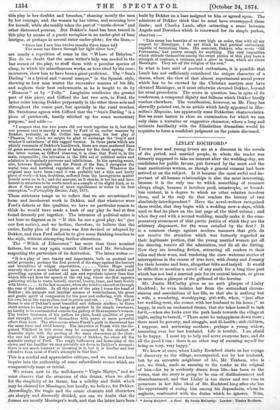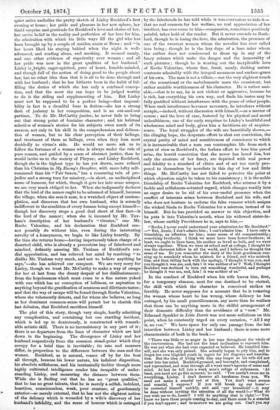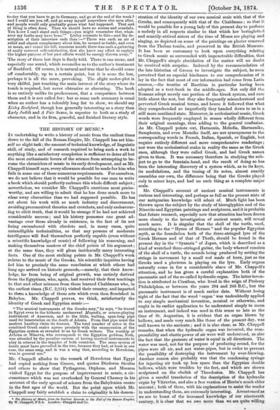LINLEY ROCHFORD.* Youxia love and young lovers are at a
discount in the novels of the period, and married people, in whom the reader was formerly supposed to take no interest after the wedding-day, are candidates for public favour, put forward by the most and the least meritorious writers, as though a general consent had been arrived at on the subject. Is it because the most awful and im- portant of all human relationships is also the most interesting, because it is the only one to which something of romance always clings, because it involves peril, Catastrophe, or bound- less content, in a degree to which no other relation involves them, and is the only tie that renders the history of two absolutely interdependent? Have the novel-writers recognised these truths, that they begin with a wedding now-a-days, which used to find its place on the last page of the third volume ; and when they end with a second wedding, usually make it the com- pensatory atonement of that poetic justice of which they are the arbitrary dispensers, for the woes entailed by the first? It is a common charge against modern manners that girls do not receive the attention which was formerly regarded as their legitimate portion, that the young married women get all the dancing, receive all the admiration, and do all the flirting. Now they are invading fiction, attracting all readers to their wiles and their woes, and rendering the once welcome stories of interruptions in the course of true love, with Jenny and Jessamy for their heroine and hero, altogether trite and insipid. It would be difficult to mention a novel of any mark for a long time past which has not had a married pair for its central interest, or given us more than a glimpse of the girlhood of the heroine.
Mr. Justin McCarthy gives us no such glimpse of Linley Rochford ; he even isolates her from the antecedent circum- stances and associations of her life, so that she is nothing but a wife, a wondering, worshipping, girl-wife, when, "just after her wedding-tour, she comes with her husband to his home ;" so happy, in such an enchanted dream, that she takes herself to task for it,—when she looks over the park lands towards the village at night, saying to herself, "There must be unhappiness down there ; there must be poverty, and struggle, and Ill-health; sick children, I suppose, and sorrowing mothers ; perhaps a young widow, lamenting over her lost husband. Life is terrible. I am afraid to be happy. I must try to help and serve everyone here, and do all the good I can ; there is no other way of excusing myself for being so very, very happy."
We know at once, when Linley Rochford starts on her voyage of discovery to the village, accompanied, not by her husband, but by an eccentric neighbour of his, Mr. Tuxham, who is not, we think, made as amusing to the reader as the original of him—for he is evidently drawn from life—has been to the writer, that the story is going to be one of disillusionment and disenchantment, and that Linley is too clever and too true to persevere in her false ideal of Mr. Rochford long after she has the opportunity of seeing him among his dependants, whom he neglects, confronted with the duties which he ignores. Wise, * 'Maley nor-zebra. A Novel. By Justin McCarthy. London : Tinsley Brothers. quiet satire underlies the pretty sketch of Linley Rochford's first evening at home ; her pride and pleasure in her new sphere, her timid surprise and gratitude for Rochford's love and choice of her, her entire belief in the reality and perfection of her love for him, the admiration with which his little ways fill the girl who has been brought up by a couple of maiden aunts at Bonn ; and "in her heart liked his staying behind when the night is well- advanced, and reading alone, and smoking. It seemed manly, and one other pvidence of superiority over woman ; and all her pride was now in the great qualities of her husband." Linley isabright, eager-spirited, pure of heart, humble-minded, and though full of the notion of doing good to the people about her, has no other idea than that it is all to be done through and with her husband ; that he has hitherto been in the habit of ful- filling the duties of which she has only a confused concep- tion, and that the most she can hope to be judged worthy to do is the aiding and supplementing of him. But Linley must not be supposed to be a perfect being—that impossi- bility in fact is a dreadful bore in fiction—she has a strong dash of jealousy in her composition, and is an out-and-out partisan. To do Mr. McCarthy justice, he never fails to bring out that strong point of feminine character ; and his habitual selection of women's stories for his subjects owes much of its success, not only to his skill in the comprehension and delinea- tion of women, but to his clear perception of their failings, and treatment of them as failings, even when they lean most decidedly to virtue's side. He would no more ask us to follow the fortunes of a woman who is always under the rule of pure reason, and guided by a sense of abstract justice, than he would invite us to the society of Phryne ; and Linley Rochford, though she is the highest type he has yet drawn, more refined than his Christina in My Enemy's Daughter, with more lofty self- command than his "Fair Saxon," has a reassuring vein of pre- judice and a strong turn for mimicry,—in short, an undisciplined sense of humour, for which, though it gets her into some scrapes, we are very much obliged to her. When she indignantly declares that the lord of the manor ought to be ashamed of himself, because the village, when she sees it near, is a wretched object of contem- plation, and discovers that her own husband, who is serenely indifferent to the condition of every human being except himself— though her discovery stops a good deal short of that fact—is the lord of the manor ; when she is incensed by Mr. Tux- ham's description of her husband's "Orestes," one Mr. Roche Valentine, and his declaration that Rochford can- not possibly do without him, even during the interesting novelty of a honeymoon, we begin to like Linley heartily. By the time she returns home—having impetuously taken charge of a deserted child, who is already a precocious imp of falsehood and mischief, defiantly assuring Mr. Tuxham of Rochford's cor- dial approbation, and has relieved her mind by resolving "to dislike Mr. Tuxham very much, and not to believe anything he says,"—she has achieved our conquest. We are very sorry for Linley, though we trust Mr. McCarthy to make a way of escape for her at last from the dreary despair of her disillusionment; from the hopelessness which must come to a fine nature yoked with one which has no conception of loftiness, or aspiration to anything beyond the gratification of sensuous and dilettante tastes ; and that the way of escape will be found through Roche Valentine, whom she vehemently detests, and for whom she believes, so long as her dominant common-sense will permit her to cherish this last delusion, that Rochford sacrifices himself.
The plot of this story, though very simple, hardly admitting any complication, and containing but one startling incident, which is led up to dexterously, is constructed with remark- able artistic skill. There is no inconsistency in any part of it ; there is no departure from the lines of character which are laid down in the beginning. The divergence of Linley and her husband respectively from the common stand-point which they occupy for a brief time is inevitable ; its rate and measure differ, in proportion to the difference between the man and the woman. Rochford, as is natural, comes off by far the best all through, because his lower nature, his indolent disposition, his absolute selfishness, and his intrinsically feebler though more highly cultivated intelligence render him incapable of under- standing Linley, and measuring the distance between them. While she is finding out that he has no "great qualities," that he has no great talents, that he is merely a selfish, indolent, heartless, conscienceless, weak, poor creature, of gentlemanly exterior—so merely external, that he has not the slightest notion of the delicacy which is wounded by a wife's discovery of her husband's infidelity, and the sense of honour which is outraged by the falsehoods he has told while it was convenient to hide it— that no real concern for her welfare, no real appreciation of her intellect, has ever come to him—compassion, sometimes positively painful, takes hold of the reader. But it never extends to Rash- ford, though he is losing the love, the admiration, the presence of one of the sweetest women whom the novelist has ever called into being ; though he is the lazy dupe of a base minx whom the author does not condescend to dress up in any of the fancy colours which make the danger and the immorality of such pictures ; though he is wearing out the inexplicable love of Roche Valentine, whose fine, frank, manly, dashing nature contrasts admirably with the integral meanness and surface-grace of his own. The man is not a villain,—not the very slightest touch of the sensational or the melodramatic mars the consistent, but rather amiable worthlessness of his character. He is rather ami. able,—that is to say, he is not violent or aggressive, because he is rich, has everything his own way, and finds his tastes may be fully gratified without interference with the peace of other people.. When such interference becomes necessary, he interferes without scruple,—indeed, without discussion with himself,—as a matter of course ; and the love of ease, fostered by his physical and moral unhealthiness, one of the early surprises to Linley's healthful and wholesome mind and body, gives him a factitious air of acquies- cence. The loyal struggles of the wife are beautifully shown,— the clinging hope, the desperate effort to shut out conviction, the crystal purity of mind and sensitiveness of conscience to which it is inconceivable that a man can contemplate life from such a. point of view as Rochford's, the forlorn effort to love him guand mime, the horrid conviction that she never has loved him, but only the creature of her fancy, are depicted with real power and fidelity to a standard of ethics and of art too rarely pro- posed to themselves by novelists in this day of low and little things. Mr. McCarthy has not failed to perceive the point at which objection might be taken to his consistency ; it is the noble friendship of Roche Valentine for Rochford, who returns it by a. feeble and selfishness-actuated regard, which changes readily into an eager desire to be rid of his ever-useful presence when the conflict of interests arises between ltochford and his wife, and who does not hesitate to endorse the false rumour which assigns the wicked Sinda to Roche Valentine for a mistress, instead of to himself. But he has provided an answer to this objection, and he puts it into Valentine's mouth, when his widowed sister-in- law, whose earthly Providence he is, says to him,—
" Roche, I never could understand your admiration for Mr. Rochford." —‘‘ But, Annie, I don't admire him ; I can't admire him. I have only a friendship, an affection for him; some sense of old companionship; something brotherly. I think we must have been foster-brothers; at least, we ought to have been, his mother so loved us both, and we were always together. When we were at school and at college, I thought he was the cleverest fellow in all the world, and I believe he thought the same of me. Do you remember the story of the Irish gentleman run- ning up to somebody whom he mistook for a friend, and who mistook him, and then falling back with the apology, 'I thought it was you, and you thought it was me, and, fair! it was neither of us'? Wells I thought Rochford was destined to turn out something wonderful, and perhaps he thought it was me, and, fax! it was neither of us."
In the conduct of Rochford when his wife leaves him, first, for a temporary absence, next for one destined to be eternal, the skill with which the character is conceived strikes us forcibly. He never supposes for a moment that he is torturing the woman whose heart he has wrung, whose delicacy he has outraged, by his small punctiliousness, any more than he realises that there can be anything more in the skilful arrangement of their domestic difficulty than the avoidance of a "row." Mr. Edmund Sparkler in Little Dorrit was not more solicitous on this point, when he constantly urged on every occasion, "All I say is, no row." We have space for only one passage from the last interview between Linley and her husband ; there is none more characteristic of both in the book :— " There was little or no anger in her tone throughout the whole of the conversation. She had not the least inclination to reproach him. He was not what she had ever expected or believed. He humbled him- self, and she was only pained. She actually began to pity him, and to forget her own blighted youth in regret for his disgrace and humilia- tion. But the idea of living with him any longer as his wife did not enter into her mind. Rochford groaned, and besought, and complained, and reproached, and went through all a weak man's agonies of sense and mind. At last he fell into a weak man's refuge of sullenness. 'At least, you teed not go this moment,' he said. You needn't cross me in everything, Linley. I don't deserve all harshness from yen. We need not make a scandal out of this. You don't want scenes and scandal, I suppose? If you will break up our home'— he corrected himself quickly, and said our household'—it may be done without inviting the attention of all the world What do you wish me to do, Louis ? I will do anything that is right.'—' You know we have these people coming to-day, and there must be a scandal if you don't appear ; and to-morrow we are going out. Can't you say to-day that you have to go to Germany, and go at the end of the week ? and I could see you off, and go away myself somewhere else soon after, and people would only gradually guess what had happened. That sort of thing is often done. Then we should have no scenes and scandals. You know I can't stand such things—you might remember that, what- ever my faults may have been.'" Linley consents to this—and the de-
scription of their interview ends thus There was such an air of relief and almost complacency about him, he seemed so feeble, and even so mean, and round his full, sensuous mouth there was such a quivering of easily restored self-satisfaction, that she knew any effort to explain the higher purpose of her past efforts would be energy thrown away.'"
The story of those last days is finely told. There is one scene, and especially one sound, which reconciles us to the author's treatment of Rochford. Of course, it is natural and true that he should come off comfortably, up to a certain point, but it is none the less, perhaps it is all the more, provoking. The slight under-plot is very skilful, just touching the main interest of the story where its touch is required, but never obtrusive or obscuring. The book is so entirely unlike its predecessors, that a comparison between them and it is not called for; but as some such summary is usual when an author has a tolerably long list to show, we should say Linley Rochford, though less generally interesting as a story than Lady Judith and A Fair Saxon, is superior to both as a study of -character, and in its firm, graceful, and finished literary style.




































 Previous page
Previous page